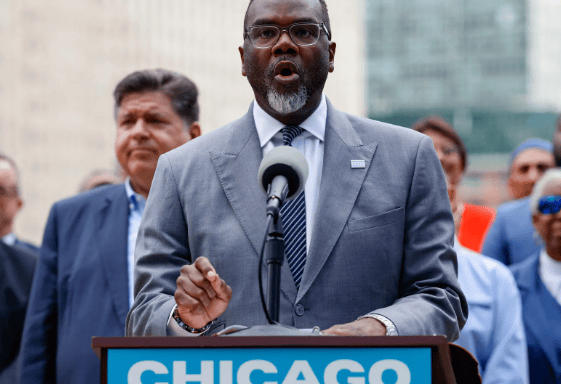Chicago, IL – Chicago is once again at the center of a heated national debate as Donald Trump vows to deploy the National Guard to combat violent crime. For some residents, the idea of federal troops patrolling the streets feels like salvation. For others, it feels like a dangerous step toward militarization that ignores the city’s real needs.
South Side Reality: “We Are the Troops”
In Bronzeville, just blocks from Chicago Police Headquarters, seven people were injured in a drive-by shooting over Labor Day weekend. The incident was one of at least 58 shootings across the city during the holiday, eight of them fatal.
But community leaders here reject Trump’s calls for soldiers. Rob White, a mentor with Chicago CRED, an anti-violence nonprofit, says the real fight is not against gangs but for the futures of young men.
“The outcome—a drop in crime—is already happening,” White said. “The troops are already here. We are the troops.”
White’s colleague, Kanoya Ali, agrees. Both argue that investment in mentorship, job training, and violence prevention works better than troops or federal crackdowns.
Trump’s Threat to Militarize Chicago
Earlier this week, Trump told reporters that the National Guard would be “going in” to stop what he described as “out-of-control crime.” He has already used similar tactics in Los Angeles and Washington, D.C., drawing praise from supporters and sharp criticism from opponents.
Illinois Governor J.B. Pritzker blasted the idea, calling Trump an “unhinged” leader. Local officials note that violent crime has already been trending downward.
According to the Council on Criminal Justice, homicides in Chicago fell by one-third in the first half of this year compared to 2024. Police Superintendent Larry Snelling confirmed the trend: “Homicides fell by 125 last year, and shooting victims dropped by more than 700.”
But Snelling also underscored the practical challenge: “The National Guard doesn’t have arrest powers. There would need to be serious coordination. What we need is more officers and resources—not soldiers.”
Canaryville Welcomes Troops
While many South Side leaders push back, other neighborhoods see Trump’s plan as common sense. In Canaryville, a predominantly white, pro-police community, flags for Blue Lives Matter hang alongside American flags.
“I can’t wait until they get here,” said Tom Stack, 68. “You gotta get rid of the criminals. This city’s crazy—there’s too much crime.”
This divide—one side demanding more resources for prevention, the other asking for troops—underscores how Chicago’s communities are split on what safety should look like.
Immigration Anxiety in Little Village
The potential arrival of federal troops has stirred another wave of fear—this time in Chicago’s Latino neighborhoods.
On Truth Social, Trump posted an image referencing the film Apocalypse Now alongside the phrase: “I love the smell of deportations in the morning.” Many believe this signals a push not only against violent crime but also toward aggressive ICE raids in immigrant communities.
In Little Village, home to Chicago’s largest Mexican community, anxiety runs high. Arturo Landa, a local mechanic, worries his neighbors will be targeted. “They’re stopping people in other cities, even with documents. They’re discriminating by skin color,” he said.
The fear is so severe that organizers canceled El Grito Chicago, the city’s Mexican Independence Day festival, citing safety concerns.
Beyond Troops: Funding Cuts and Community Struggles
Community leaders point to a deeper issue: federal funding cuts. Programs designed to intercept illegal guns and offer alternatives to gang life have lost support under Trump’s policies.
“These cuts are devastating,” said White. “We had programs that worked—now we’re scrambling.”
Democratic leaders echo the concern, arguing that troop deployments won’t fix systemic problems like gun trafficking across state borders, economic inequality, and lack of investment in youth programs.
Chicago’s Crossroads
Chicago is at a pivotal moment. On one hand, violent crime remains higher than in most major U.S. cities. On the other, data shows that community-led anti-violence initiatives are slowly but steadily reducing homicides and shootings.
The choice is clear but deeply polarizing: Will Chicago’s future be shaped by boots on the ground, or by grassroots leaders already working to save lives without soldiers or tanks?
For residents like Tom Stack, National Guard deployment represents law, order, and safety. For Rob White and Kanoya Ali, it risks overshadowing the very progress being made by the city’s own “troops”—mentors, teachers, and neighbors fighting for Chicago’s soul.

